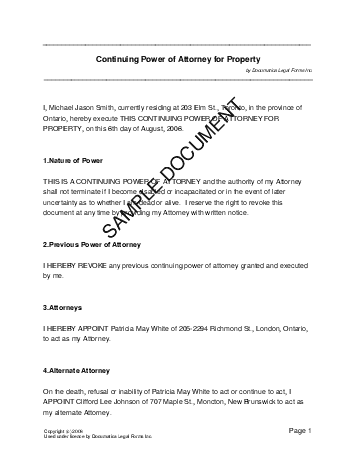Governing Jurisdiction:
Governing Jurisdiction:
Donor's Contact Information:
Donor's Contact Information:
Attorney Details:
Attorney Details:
Attorney Contact Information:
First Attorney's Contact Information:
Second Attorney's Contact Information:
Alternate Attorney Details:
Alternate Attorney Details:
Alternate Attorney Contact Information:
First Alternate Attorney's Contact Information:
Second Alternate Attorney's Contact Information:
Attorney Compensation/Benefits:
Power of Attorney Duration:
Power of Attorney Duration:
Determination of Incapacity:
Enter your description so it begins the sentence: [description] will be conclusive proof of my incapacity.
Powers Granted:
Powers Granted:
Attorney Responsibilities/Restrictions:
Signatures Required:
In Alberta, your Power of Attorney MUST be signed in front of one witness to be valid. The witness cannot be the Attorney, or a spouse or partner of the Attorney or the Donor. To make your document more acceptable at financial institutions and other organizations, we highly recommend the presence of a Notary Public or Commissioner of Oaths. Please choose the appropriate options below.
To ensure the validity of this document, have it signed in the presence of a Notary Public and one or more witnesses. This will make your document more acceptable at financial institutions and other organizations. Please choose the appropriate options below.
In Saskatchwan, your Power of Attorney MUST be witnessed by a lawyer OR two witnesses. The witnesses must be adults, and cannot be the Attorney, or a spouse of the Attorney or the Grantor. To make your document more acceptable at financial institutions and other organizations, we highly recommend the presence of a Notary Public or Commissioner of Oaths. Please choose the appropriate options below (if a lawyer will be witnessing this document, select that you WOULD like a certificate of legal advice).
In Manitoba, your Power of Attorney MUST be signed in front of a Notary Public and one witness to be valid. The witness cannot be your Attorney or his/her spouse. Please choose the appropriate options below.
To ensure the validity of this document, have it signed in the presence of a Notary Public and one or more witnesses. This will make your document more acceptable at financial institutions and other organizations. Please choose the appropriate options below.
In New Brunswick, your Power of Attorney MUST be signed in front of one witness (who is NOT your Attorney) to be valid. To make your document more acceptable at financial institutions and other organizations, we highly recommend the presence of a Notary Public or Commissioner of Oaths. Please choose the appropriate options below.
In Prince Edward Island, your Power of Attorney MUST be signed in front of one witness (who is NOT your Attorney or your Attorney's spouse) to be valid. To make your document more acceptable at financial institutions and other organizations, we highly recommend the presence of a Notary Public or Commissioner of Oaths. Please choose the appropriate options below.
In Newfoundland and Labrador, your Power of Attorney MUST be signed in front of one witness (who is NOT your Attorney or your Attorney’s spouse) to be valid. To make your document more acceptable at financial institutions and other organizations, we highly recommend the presence of a Notary Public or Commissioner of Oaths. Please choose the appropriate options below.
In the Yukon Territory, your Power of Attorney MUST be accompanied by a certificate of legal advice signed by a lawyer (who cannot be your Attorney or his/her spouse). Please select this option below. To make your document more acceptable at financial institutions and other organizations, we highly recommend the presence of a Notary Public or Commissioner of Oaths. Finally, the Attorney(s) MUST acknowledge the appointment using the form that will print out automatically with your document.
In the Northwest Territories, your Power of Attorney MUST be signed in front of one witness (who is NOT your Attorney or your Attorney's spouse) to be valid. To make your document more acceptable at financial institutions and other organizations, we highly recommend the presence of a Notary Public or Commissioner of Oaths. Please choose the appropriate options below.
A Witness Certificate is signed by the witness(es), whereas an Affidavit of Execution must be sworn by the witness(es) before a Notary Public or Commissioner of Oaths.
Date of Signing, if known:
Place of Signing:
Build Document (and save progress)

